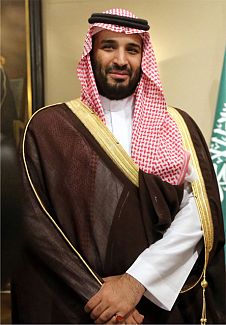HRH Crown Prince Mohammed bin Salman Al-Saud is the Crown Prince and Prime Minister of Saudi Arabia. He is widely regarded as the Kingdom’s de facto ruler and principal architect of its current political, economic, and social transformation. He is often referred to in western media as MBS.
Birth: 31 August 1985 (Age: 40)
Source of Influence: Political
Influence: De facto ruler of Saudi Arabia
School of Thought: Sunni, Salafi, Moderate Salafi
Status: Featured in current year
HRH Crown Prince Mohammed bin Salman Al-Saud is the Crown Prince and Prime Minister of Saudi Arabia. He is widely regarded as the Kingdom’s de facto ruler and principal architect of its current political, economic, and social transformation. He is often referred to in western media as MBS.
Meteoric Rise: At the beginning of 2015, Mohammed bin Salman (MBS) was a relatively unknown prince outside Saudi Arabia. Following his father’s accession to the throne in January 2015, he was quickly elevated to a series of senior posts, including Minister of Defense and head of the Council of Economic and Development Affairs. In June 2017, he was named Crown Prince after King Salman removed Prince Mohammed bin Nayef. In September 2022, he was appointed Prime Minister—a position traditionally held by the King—further consolidating his power.
Catalyst of Change: The Crown Prince has spearheaded sweeping reforms that have reshaped Saudi society. Restrictions on women have eased significantly: they can now drive, travel independently, and participate more fully in public life. Cinemas reopened in 2018, music festivals and international sporting events are regularly hosted, and Saudi Arabia is positioning itself as a cultural hub for the Arab world. His anti-corruption drive in 2017, which saw the detention of princes and business leaders at Riyadh’s Ritz-Carlton, recovered billions in assets, though critics described it as a power-consolidation measure.
Vision 2030: Central to MBS’s legacy is Vision 2030, an ambitious national strategy launched in 2016 aimed at diversifying the economy away from oil dependency. The plan envisions Saudi Arabia as a global investment powerhouse and innovation hub. Flagship projects include NEOM, a futuristic mega-city marketed as a centre for renewable energy, biotech, and AI; Qiddiya, a new entertainment and sports capital; and the Red Sea Project, aimed at positioning the Kingdom as a premier tourism destination. The Public Investment Fund (PIF), with assets exceeding $900 billion, plays a key role in financing these ventures. Saudi Arabia also secured the right to host the 2034 FIFA World Cup, a central soft-power victory that cements its place in the global sporting landscape.
International Relations: MBS has overseen a recalibration of Saudi foreign policy. Under his leadership, Riyadh restored ties with Iran in March 2023 through Chinese mediation, reduced its direct involvement in the Yemen war, and reopened channels with Syria. Relations with the United States and Europe remain strained over human rights concerns and the 2018 murder of journalist Jamal Khashoggi, which U.S. intelligence agencies concluded was approved by the Crown Prince, though he has consistently denied ordering it. Nonetheless, he has successfully balanced ties with Washington, Moscow, and Beijing while projecting Saudi Arabia as a middle power with growing autonomy.
Humanitarian and Philanthropic Engagement: Through initiatives such as the Misk Foundation, established to empower youth and entrepreneurs, MBS has directed substantial resources toward social development. Saudi Arabia has provided billions in humanitarian aid: $500 million to the UN’s Yemen Response Plan, $200 million to support Jordan hosting refugees, and over $13 million to the domestic Ehsan platform for charitable giving.
The Gaza Genocide: MBS has repeatedly condemned Israel’s bombardment as disproportionate and “collective punishment,” while affirming Saudi commitment to Palestinian statehood based on the 2002 Arab Peace Initiative. The Kingdom has facilitated regional coordination to deliver aid into Gaza and lobbied Washington to press Israel on humanitarian access.
“All success stories start with a vision, and successful visions are based on strong pillars.”
200 thousand years of human habitation in the kingdom
85% of more than the 1,500 initiatives under Saudi Vision 2030 had been completed or are on track



